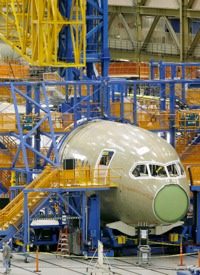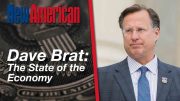
As readers of The New American are aware, in what some have called its “worst decision,” the NLRB unloaded its regulatory arsenal on American aircraft manufacturer Boeing, Inc. and nearly eliminated a thousand jobs — American jobs — in the process.
With the American economy mired in the contrived quicksand of the Federal Reserve’s boom/bust cycle, Boeing struck out and threw a rope of hope to thousands of American families by opening a new 787 Dreamliner assembly plant in South Carolina. For such an ambitious undertaking, the Chicago-based aerospace and defense company received nearly universal praise. One prominent exception: the federal government in the form of the NLRB.
Rather than praise Boeing’s bravery and good will, the NLRB filed a federal lawsuit. The federal agency bared its litigious teeth after being “taunted” by Boeing’s lauding of South Carolina’s industry-friendly “right to work” labor laws. This was a welcome change in atmosphere from union-loving Washington state where the company’s manufacturing hub is currently located.
There was a definite agenda behind Boeing’s choice of South Carolina for its new plant. With threats of strikes sounding through the hangars in Puget Sound, the company needed somewhere to continue crafting the 787 should the unions shut down operations on the West Coast.
That much lauding of a labor system supportive of job creation was too much for an arm of the federal government that cannot bear to have the private sector do something to save even one little corner of the country at a time when everyone should be suffering together.
The NLRB’s complaint was filed by the Acting General Counsel Lafe Solomon after investigating charges leveled against the company by the International Association of Machinists and Aerospace Workers union District 751 regarding Boeing’s negotiating tactics during labor disputes.
A news release sent by Solomon’s office declared:
A worker's right to strike is a fundamental right guaranteed by the National Labor Relations Act. We also recognize the rights of employers to make business decisions based on their economic interests, but they must do so within the law. I have worked with the parties to encourage settlement in the hope of avoiding costly litigation, and my door remains open to that possibility.
The NLRB reported that it had "found reasonable cause to believe that Boeing had violated two sections of the National Labor Relations Act because its statements were coercive to employees and its actions were motivated by a desire to retaliate for past strikes and chill future strike activity."
The business lobby has responded to the complaint with a vigorous defense of Boeing and its practices. Predictably, Republicans in Congress have also flown to the defense of Boeing, insisting that if the NLRB’s action against Boeing is successful, South Carolina (and by extension several right-to-work states across Dixie) will lose jobs now and in the future, as corporations will avoid incurring the wrath of the administration and the NLRB.
As Michael Tennant accurately described in a piece published earlier this year in The New American:
Boeing now finds itself in the unenviable position of having to defend itself against an opponent with virtually unlimited resources and an obvious animus against capitalism. Craig Becker, who was appointed to the NLRB by President Barack Obama during a congressional recess despite the fact that the Senate had previously rejected his nomination to the board, wrote in the January 1987 Harvard Law Review:
The right to engage in concerted activity that is enshrined in the Wagner Act — even when construed in strictly contractual terms — implicitly entails legal restraint of the freedom of capital. What threatens to eviscerate labor’s collective legal rights, therefore, is less the common law principle of individual liberty than the mobility of capital, which courts have held immune from popular control.
In other words, businesses should not be able to pick up and move from states where unions have a stranglehold on them to states that offer a more business-friendly climate. Becker has also served as attorney for the Service Employees International Union and the AFL-CIO. Knowing his written opinion and his employment history, you don’t have to be The Amazing Kreskin to figure out whose side he will take in the Boeing case.
The relief prayed for in the labor board’s complaint is the closure of the new plant.
There is hope that Boeing’s prayer that all this legal lashing may soon be over will be answered.
An article published recently in the Chicago Tribune highlights the reason for the hope:
With little fanfare, board Chair Wilma Liebman left the agency after her term expired Aug. 27. President Barack Obama’s recess appointment of another board member, labor lawyer Craig Becker, runs out Dec. 31. Combined with a long-standing vacancy, those departures would leave just two of the board's five seats occupied. So in the absence of any new appointments — which Republicans have vowed to block — the board will fall short of a quorum.
The complete absence of a quorum in an unconstitutional arm of the executive branch sounds like the perfect recipe for rapid ramping up and rebuilding America’s manufacturing might.
Beyond the very salient fact that its very existence is nowhere anticipated by any of the enumerated powers granted by the states to the federal government in the Constitution, the NLRB’s behavior in the Boeing case is reprehensible in other ways, as well.
The union-loving members of the board promulgated new rules and promoted old ones that removed dozens of regulatory obstacles on the road to unionizing. Workers were encouraged and enabled to form unions and then press management for concessions. The board went so far as to force private companies to post notices reminding workers of their “right to unionize.”
Currently, the hangars are open in North Charleston and skilled American workforce employed there are preparing to roll the first 787 Dreamliner off the assembly line. In defiance of the federal government’s attempt to ruin its business, Boeing has hired 1,000 workers in the past year and numerous 787-related shops have grown up around the new hub, providing livelihoods to thousands of other Americans.
What will happen if the empty seats on the NLRB are filled by President Obama with bureaucrats bent on bankrupting Boeing? As the Chicago Tribune sees it:
If Solomon gets his way, forcing production to Washington, Boeing will be stuck with a $750 million custom-built plant and a trained workforce that can't be used. Beyond that, the 787 already is running three years behind schedule. An additional government-imposed delay would be a gift to European rival Airbus.
Perhaps more devastating than the effect an NLRB victory would have on Charleston, South Carolina, is the ripple effect that would disrupt the growth of business nationwide. Would any company feel confident investing millions in building new factories or hiring and training thousands of workers with the specter of being shuttered was constantly hovering about the shop?
As President Obama prepares to set out on the campaign trail in advance of the 2012 presidential elections, the case of NLRB v. Boeing is haunting his efforts to portray himself as the nation’s best hope for economic recovery. Can a President claim with a straight face to favor the creation of new jobs when his very own executive appointees are filing lawsuits with the aim of destroying them?



